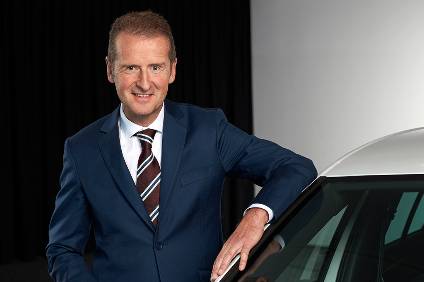
German prosecutors plan to file criminal charges against the current Volkswagen AG CEO, chairman, and a former CEO, alleging they intentionally delayed telling investors about the carmaker’s cheating of US diesel emissions tests. However, VW late on Thursday denied the allegation, claiming the share price fell because US authorities published their allegations “completely unexpectedly during ongoing discussions with Volkswagen”.
According to Reuters’, and other media reports, prosecutors in Braunschweig said on Tuesday (24 September) they aimed to charge VW CEO Herbert Diess, chairman Hans Dieter Poetsch and former CEO Martin Winterkorn with stock market manipulation.

Discover B2B Marketing That Performs
Combine business intelligence and editorial excellence to reach engaged professionals across 36 leading media platforms.
The charges, four years after the automaker admitted using illegal software to cheat US diesel engine emission tests, showed it was still struggling to move on from a scandal which has cost it over US$30bn (GBP24bn) in vehicle refits, fines and provisions, Reuters noted.
The news agency also noted that court proceedings are under way over that admission from September 2015.
This new indictment from the Braunschweig prosecutors – in VW’s home region of Lower Saxony – was part of a separate legal move to try managers over allegations they delayed disclosing the scandal to investors.
Lawyers for the three accused told media they would contest the charges while VW said its supervisory board would meet immediately to discuss the indictments which, if accepted by a Braunschweig state court, would lead to a trial date being set.
Diess’ lawyer told Reuters the indictment would not hinder him in his role as CEO, adding that, as Diess did not join Volkswagen until July 2015, he could not have foreseen the scandal would have such a huge impact on the company.
Reuters also noted VW and its executives have said the fallout from the scandal was not foreseeable and they had expected to reach a settlement with US authorities prior to the disclosure of the test cheating.
But the Braunschweig prosecutors said the accused should have kept investors informed.
“They pursued a strategy to achieve a settlement with the US authorities without disclosing all relevant information,” they said in a statement cited by Reuters.
Winterkorn, who resigned in the days after the scandal broke, having been CEO for eight years, told German lawmakers in early 2017 he did not find out about the cheating any earlier than VW had officially admitted, Reuters also noted.
Poetsch became a management board member at Volkswagen in 2004 and was made chairman in 2015.
VW said in a statement late on Tuesday (24 September) its supervisory board executive committee had indeed met “at short notice”.
Referring to the Brunswick public prosecutor’s office saying earlier it had brought the indictments, VW responded: “In the run-up to this decision, Volkswagen has cooperated closely with the public prosecutor’s office.
“The supervisory board has also dealt in detail with the investigation of the public prosecutor’s office and has respect for the public prosecutor’s office’s work.
“Nevertheless, based on its own extensive and independent investigations since autumn 2015, the executive committee still can, also from today’s perspective, not see that the capital market was deliberately not informed.
“In addition to the presumption of innocence in general, there are, among other things, also the following specific aspects that speak against the charge of market manipulation: The substantial decrease in the share price of the VW share after publication of the Notice of Violation on 18 September 2015 is due to the fact that the US authorities published their allegations completely unexpectedly during ongoing discussions with Volkswagen.
“The VW AG management board] could not foresee this change in the approach of the US authorities. In this respect, the [board] could rely on the legal advice of the renowned US law firm Kirkland & Ellis. On the basis of [their] advice, it was to be assumed until the publication of the Notice of Violation that, as was the customary practice until then, a mutually agreed solution would first be worked out with the US authorities and then presented to the public in a joint statement.
“Based on the findings available, the executive committee is therefore of the opinion that, prior to the publication of the Notice of Violation, the [VW AG management board] did not have sufficiently concrete indications that would have led to the obligation to inform the capital market immediately.
“For this reason, the successful cooperation with the chairman of the supervisory board and the chairman of the board of management shall be continued.
“The supervisory board will convene tomorrow [Wednesday 25 September] for an extraordinary meeting.”
‘Dieselgate’ to date here: Volkswagen’s emissions crisis






